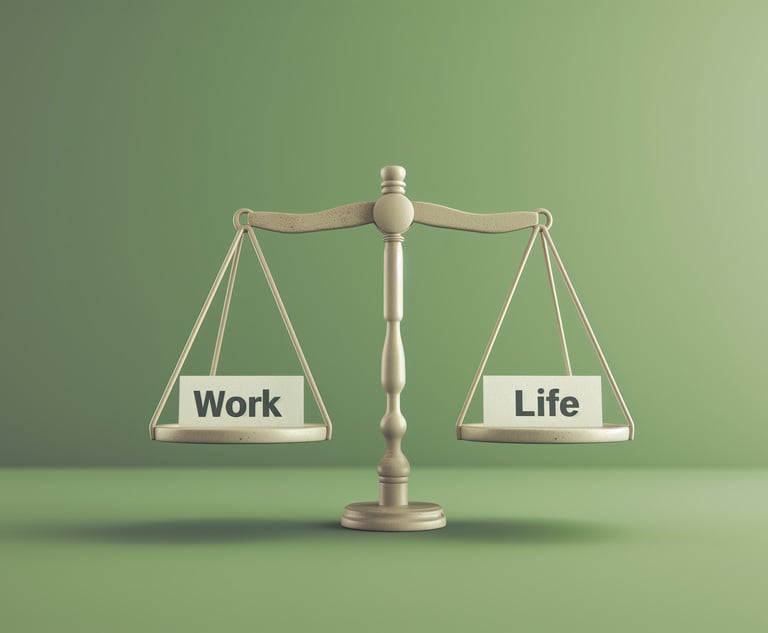Australian Lawyers Push Back on Long Hours
In response, some law firms are actively promoting the importance of work-life balance. One firm even tells its young lawyers to leave the office by 6 p.m.
September 11, 2019 at 05:00 AM
6 minute read
 Photo: Andrey Popov
Photo: Andrey Popov
Punishing working hours have long been accepted as part of the legal profession. But in Australia, a growing number of professionals are pushing back, with one senior lawyer warning that firms will need to hire more lawyers at the expense of partner salaries.
Some lawyers in Australia have lodged complaints with workplace regulators, and one firm has told young lawyers they should leave work by 6pm.
Last year's Royal Commission into Misconduct in the Banking Superannuation and Financial Services Industry brought the issue of working hours to the fore, as its tight deadlines had large teams of lawyers regularly working late into the night and on weekends.
"As exceptional as the circumstances of the Royal Commission are, this episode points to a deeper truth that most lawyers are already aware of – that overwork is endemic to the profession," the Legal Forecast, a not-for-profit group that represents early-career professionals, wrote in a recent position paper.
The Legal Forecast believes the legal profession should respond to ongoing challenges by developing smarter and better ways of practising law. "It is our position that the time has come for the legal profession to overhaul its work practices to significantly reduce overwork in the profession," the group stated.
Overwork complaints filed
The comments come after a staff member at King & Wood Mallesons lodged a complaint with the workplace and safety regulator in Victoria, in southeastern Australia, about working hours arising from the Banking Royal Commission.
The firm responded to the resulting "improvement notice" from the regulator by adding additional staff; introducing fortnightly monitoring of hours worked and check-in conversations with those people working long hours and planning for their recovery; and by introducing extra processes to identify and manage what it calls extra demand matters, among other initiatives.
In February, the regulator said it was satisfied with the response and that no further action was required.
"The Worksafe Victoria situation was difficult for us given the importance of the health, safety and wellbeing of our people," said King & Wood's Australia chief executive partner Berkeley Cox.
"However, it provided a catalyst for renewing and enhancing our focus on this critical issue. We have learned a lot from the experience. In fact, we believe it will lead to positive change for our firm and for the broader industry."
In New South Wales, a young lawyer at top-tier local firm Gilbert + Tobin filed a complaint to health and safety regulator SafeWork NSW about working hours, alleging some lawyers slept in their offices 60 to 80 nights a year and took caffeine supplements to keep up with the workload. The regulator did not take any action and managing partner Danny Gilbert rejected the claims.
When the Banking Royal Commission was at its height last year, Scarlet Reid's team at McCullough Robertson was working to midnight and on weekends to meet the deadlines. While the Royal Commission's "extreme" deadlines made for intense workloads, long hours at the firm were not unprecedented, said Reid, a Sydney-based partner at the firm, which spans Australia's east coast.
She said work in a law firm usually ebbs and flows, where very busy periods are balanced out by quieter times, but added: "If it gets to the point where you're just constantly too busy, that's a wider resourcing issue."
Achieving a work-life balance
Reid questioned the business model of law firms, which relies on billing as many lawyer hours as possible to clients.
"The key that's driving all this is revenue and I think, if you wanted to change the culture across the industry and make it more of a job and less of a lifestyle choice where you work all kinds of hours, then partners of big firms are going to have to make a lot less money," she said. "Whether or not they want to do that is a different story."
However, Reid said the solution isn't always to reduce working hours, but instead to give lawyers more control over their work. "Lawyers get passionate about their work and they want to stay on the matter. Sometimes, that necessitates long hours if they see the sense of ownership in the work and they want to stay on it," she said.
In her own team, she makes an effort to recognise staff who have been working long hours with time off or rewards such as vouchers to have dinner with their loved ones.
National firm HWL Ebsworth has gone even further in its efforts to discourage overwork – the firm has responded to the issue by telling its young lawyers that the firm wants them out the door by 6pm.
Managing partner Juan Martinez believes providing reasonable work hours helps the firm retain more staff. "Pumping hours at an unreasonable rate is not culturally, or from a business perspective, aligned with how we think in the long term," he told the Australian Financial Review recently. Martinez declined an interview.
The firm – Australia's largest by partner numbers – expects young lawyers to meet billing targets of just 3.5 hours a day.
"As a profession, we must be more conscious of the pressures we place on our colleagues and particularly young lawyers," said Sydney barrister and Law Council of Australia president, Arthur Moses SC. "Law firms, especially large top-tier firms, must ensure their employees are not overworked."
Moses said it was incumbent on judges and royal commissioners not to set unrealistic deadlines for lawyers.
The profession is changing, with flexible work conditions and agile workplaces becoming more common, allowing lawyers to choose when and where they work.
"The mental health and wellbeing of members of the legal community is increasingly a central concern and one the profession has taken numerous steps to improve," Moses said.
He urges more employers to promote the importance of work-life balance.
That may not be so easy.
In a 2012-13 national survey of more than 1,000 lawyers, University of New South Wales law professor Janet Chan and her colleagues found long working hours were a major cause of stress for lawyers. Yet according to her paper, Lawyering Stress and Work Culture: An Australian Study, nearly three quarters of lawyers agreed that "to excel as a lawyer, one must be willing to work long hours".
"Commercial firms' concern with profit has escalated billable hours and in turn the number of hours worked, so that working long hours, being adaptable to the timezones of international clients, and meeting the quota of billable hours have become expected practice in large law firms," Chan wrote.
Related Stories:
Down Under, Law Firms Can Pay a Price for Overworking Lawyers
Amid Concerns Over Lawyer Workloads, US Firms Embrace 'Agility'
This content has been archived. It is available through our partners, LexisNexis® and Bloomberg Law.
To view this content, please continue to their sites.
Not a Lexis Subscriber?
Subscribe Now
Not a Bloomberg Law Subscriber?
Subscribe Now
NOT FOR REPRINT
© 2025 ALM Global, LLC, All Rights Reserved. Request academic re-use from www.copyright.com. All other uses, submit a request to [email protected]. For more information visit Asset & Logo Licensing.
You Might Like
View All
‘Raises More Questions Than Answers’: Partners Puzzled by Leadership Change at UK Competition Regulator


Long Hours, Lack Of Boundaries: Associates In India Are Leaving Their Firms
Trending Stories
- 1‘High Demand’: Former Trump Admin Lawyers Leverage Connections for Big Law Work, Jobs
- 2Considerations for Establishing or Denying a Texas Partnership to Invest in Real Estate
- 3In-House AI Adoption Stalls Despite Rising Business Pressures
- 4Texas Asks Trump DOJ to Reject Housing Enforcement
- 5Ideas We Should Borrow: A Legislative Wishlist for NJ Trusts and Estates
Who Got The Work
J. Brugh Lower of Gibbons has entered an appearance for industrial equipment supplier Devco Corporation in a pending trademark infringement lawsuit. The suit, accusing the defendant of selling knock-off Graco products, was filed Dec. 18 in New Jersey District Court by Rivkin Radler on behalf of Graco Inc. and Graco Minnesota. The case, assigned to U.S. District Judge Zahid N. Quraishi, is 3:24-cv-11294, Graco Inc. et al v. Devco Corporation.
Who Got The Work
Rebecca Maller-Stein and Kent A. Yalowitz of Arnold & Porter Kaye Scholer have entered their appearances for Hanaco Venture Capital and its executives, Lior Prosor and David Frankel, in a pending securities lawsuit. The action, filed on Dec. 24 in New York Southern District Court by Zell, Aron & Co. on behalf of Goldeneye Advisors, accuses the defendants of negligently and fraudulently managing the plaintiff's $1 million investment. The case, assigned to U.S. District Judge Vernon S. Broderick, is 1:24-cv-09918, Goldeneye Advisors, LLC v. Hanaco Venture Capital, Ltd. et al.
Who Got The Work
Attorneys from A&O Shearman has stepped in as defense counsel for Toronto-Dominion Bank and other defendants in a pending securities class action. The suit, filed Dec. 11 in New York Southern District Court by Bleichmar Fonti & Auld, accuses the defendants of concealing the bank's 'pervasive' deficiencies in regards to its compliance with the Bank Secrecy Act and the quality of its anti-money laundering controls. The case, assigned to U.S. District Judge Arun Subramanian, is 1:24-cv-09445, Gonzalez v. The Toronto-Dominion Bank et al.
Who Got The Work
Crown Castle International, a Pennsylvania company providing shared communications infrastructure, has turned to Luke D. Wolf of Gordon Rees Scully Mansukhani to fend off a pending breach-of-contract lawsuit. The court action, filed Nov. 25 in Michigan Eastern District Court by Hooper Hathaway PC on behalf of The Town Residences LLC, accuses Crown Castle of failing to transfer approximately $30,000 in utility payments from T-Mobile in breach of a roof-top lease and assignment agreement. The case, assigned to U.S. District Judge Susan K. Declercq, is 2:24-cv-13131, The Town Residences LLC v. T-Mobile US, Inc. et al.
Who Got The Work
Wilfred P. Coronato and Daniel M. Schwartz of McCarter & English have stepped in as defense counsel to Electrolux Home Products Inc. in a pending product liability lawsuit. The court action, filed Nov. 26 in New York Eastern District Court by Poulos Lopiccolo PC and Nagel Rice LLP on behalf of David Stern, alleges that the defendant's refrigerators’ drawers and shelving repeatedly break and fall apart within months after purchase. The case, assigned to U.S. District Judge Joan M. Azrack, is 2:24-cv-08204, Stern v. Electrolux Home Products, Inc.
Featured Firms
Law Offices of Gary Martin Hays & Associates, P.C.
(470) 294-1674
Law Offices of Mark E. Salomone
(857) 444-6468
Smith & Hassler
(713) 739-1250









